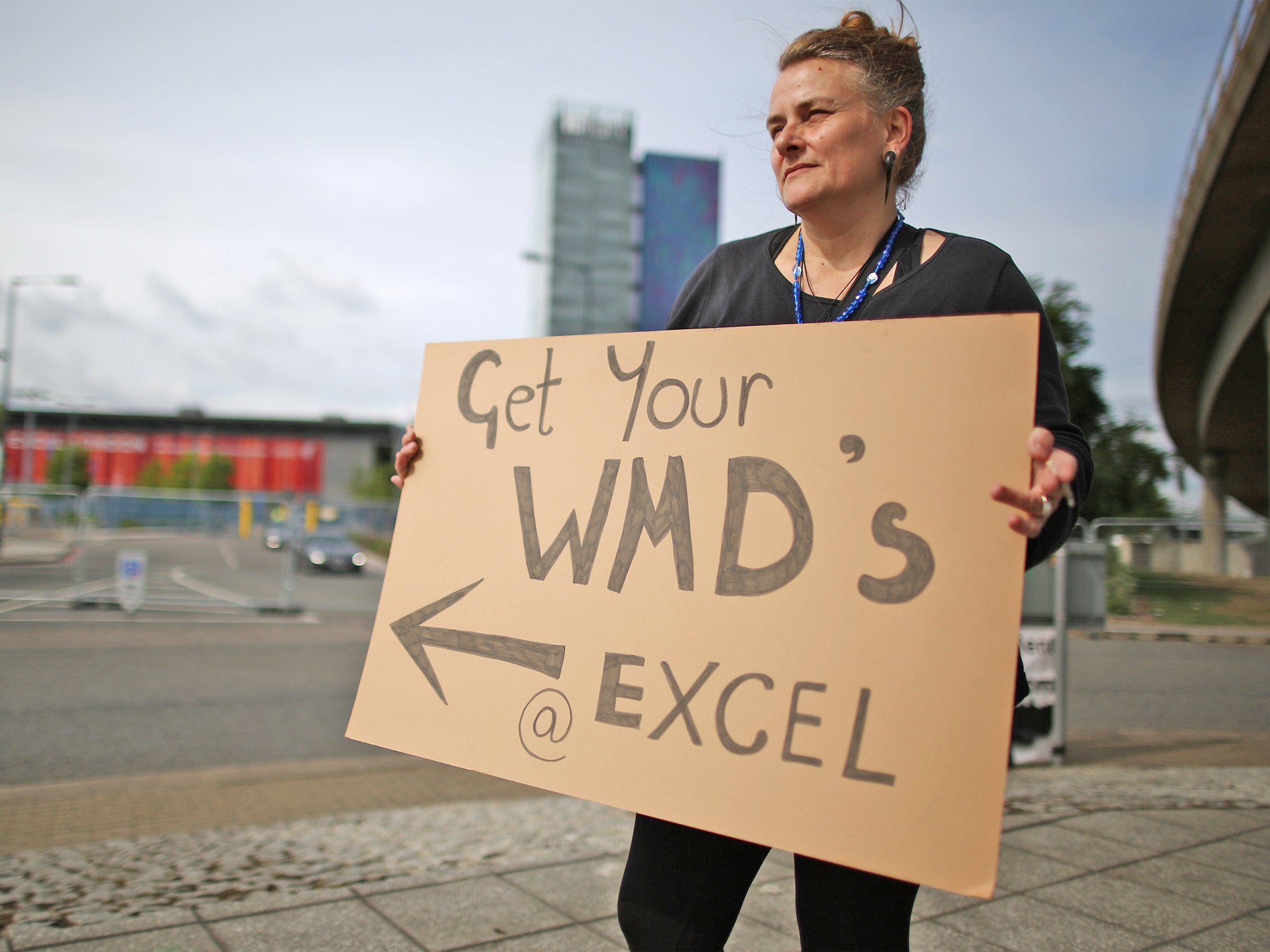Where the worst dictators love to shop: World’s largest arms fair comes to London
Biennial extravaganza attended by delegations from Turkmenistan, Uzbekistan and Bahrain
As slogans go for drumming up trade in the world’s largest arms fair, it was at least original. While other delegates in London’s Docklands were busy boasting about their kill rates and payload capacities, the South Korean navy had a different message: “We engrave your names in our hearts with love.”
This military billet doux, printed in 4ft-high letters on a banner hanging from the side of the destroyer Dae Jo Yeong moored next to the ExCeL Exhibition centre, was an expression of enduring gratitude to Britain to mark the 60th anniversary of the end of the Korean War. As a smiling Commander Lee Gyu Hong put it: “We are here to show friendship between nations.”
It may not have quite been “make love not war” but it was about as close as the Defence and Security Equipment International (DSEI) fair came today to departing from its billing as a “highly-regulated event complying with international laws and treaties” designed to provide a shop window for 1,500 manufacturers of a bamboozling range of lethal weaponry.
The biennial extravaganza, which will be attended over four days by 30,000 people including delegations from such beacons of democracy as Turkmenistan, Uzbekistan and Bahrain, is taking place against the not entirely helpful backdrop for those in the arms industry of swingeing defence cuts on both sides of the Atlantic and a dwindling public and political appetite for western military intervention exemplified by Syria.
The result is that Britain’s defence and security industry, which employs some 400,000 people and last year generated exports worth £11.5bn, is having to cast its net increasingly wide in an increasingly competitive market to make its sales of equipment ranging from BAE Systems’ Hawk jets to a Bristol company making eco-friendly waste disposal units for use in the battlefield.
Howard Wheeldon, a leading industry expert, told The Independent: “There has been a sea-change. There is a weariness in the public view concerning military intervention. And the defence industry adapts to change.
“Geo-political events such as Syria have little immediate impact. But the industry knows it is going to be getting less from domestic government customers and if it is going to continue growing, it needs to look for sales in new countries that are going to expand their defence budgets and where we are content they are safe nations to sell to.”

Quite where Uzbekistan, Turkmenistan and Saudi Arabia (Britain’s biggest defence client), respectively ranked 161 to 163 out of 167 nations listed in the Economist Democracy Index, fit in the list of safe nations is a matter of strenuous debate between UK Trade and Investment and anti-arms trade campaigners, who expressed concern about the Government-approved list of official trade delegations attending DSEI including Algeria, Iraq and Afghanistan.
Sarah Waldron, of the Campaign Against Arms Trade, said: “The UK Government has condemned the terrible violence in Syria - yet it is still inviting other brutal dictators to an arms fair. When they make their deals, they are not just buying weapons - they are also buying the UK’s silence on their appalling human rights records.”
Judging by the amount of exotic khaki and gold braid stalking the cavernous halls of ExCeL, which was last year host to the not quite so mortal combat of boxing and taekwondo at the London Olympics, such concerns are not necessarily impeding business.
As one representative of a substantial defence vehicle manufacturer put it: “The UK is extremely tight on this stuff so it shows how ruthlessly competitive it is out there if we’re willing to invite somewhere like Turkmenistan to the party. Of course we have to be careful selling to countries like that but this is a dilemma as ancient as deciding whether or not to sell longbows to the French after Agincourt. We work unbelievably hard to get it right.”

Indeed, from the unveiling of a new armoured personnel carrier with more computer wizardry in the cab than an Airbus to the debut appearance at DSEI of Estonia, whose stand boasted a scale-model of a mobile bomb shelter and morgue accessorised with a Ken and Barbie in fatigues, evidence of the global race for arms trade dollars abounded.
Organisers were reticent about just how how much weaponry will be bought in the coming days, although Defence Secretary Philip Hammond turned up to announce a £250m naval missile defence deal along with a warning to Brussels to avoid excessive interference in Britain’s arm export strategy.
But, in challenging times, there was also proof of defence manufacturers’ creativity. Less Lethal Africa, a Canadian-based exhibitor, was busy trying to pitch its range of rubber bullets suitable for standard rifles such as the Kalashnikov to be used in crowd control in developing countries.
Sales director Greg Rickard said: “Our idea is to provide a less lethal option in circumstances where at the moment a country might use live ammunition. We would say to customers it is better to have 20 people in hospital rather than 30 lying dead.”

Join our commenting forum
Join thought-provoking conversations, follow other Independent readers and see their replies
Comments